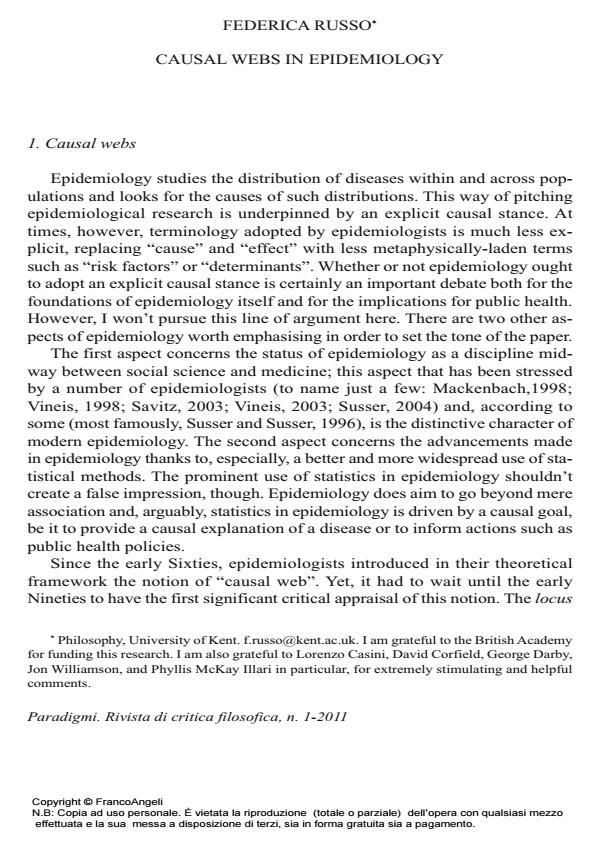Causal Webs in Epidemiology
Journal title PARADIGMI
Author/s Federica Russo
Publishing Year 2011 Issue 2011/1
Language English Pages 31 P. 67-97 File size 318 KB
DOI 10.3280/PARA2011-001005
DOI is like a bar code for intellectual property: to have more infomation
click here
Below, you can see the article first page
If you want to buy this article in PDF format, you can do it, following the instructions to buy download credits

FrancoAngeli is member of Publishers International Linking Association, Inc (PILA), a not-for-profit association which run the CrossRef service enabling links to and from online scholarly content.
The notion of "causal web" emerged in the epidemiological literature in the early Sixties and had to wait until the Nineties for a thorough critical appraisal. Famously, Nancy Krieger argued that such a notion isn’t helpful unless we specify what kind of spiders create the web. This means, according to Krieger, (i) that the role of the spiders is to provide an explanation of the yarns of the web and (ii) that the sought spiders have to be biological and social. This paper contributes to the development of the notion of causal web, elaborating on the two following points: (i) to catch the spiders we need multi-fold evidence - specifically, mechanistic and difference-making - and (ii) for the eco-social approach to be explanatory, the web has to be mechanistic in a sense to be specified.
Keywords: Causal web, Disease causation, Epistemic causality, Mechanism, Social epidemiology, Levels of causation
- Information Channels and Biomarkers of Disease Phyllis Illari, Federica Russo, in Topoi /2016 pp.175
DOI: 10.1007/s11245-013-9228-1 - Evaluating Evidence of Mechanisms in Medicine Veli-Pekka Parkkinen, Christian Wallmann, Michael Wilde, Brendan Clarke, Phyllis Illari, Michael P. Kelly, Charles Norell, Federica Russo, Beth Shaw, Jon Williamson, pp.91 (ISBN:978-3-319-94609-2)
- Supporting a Healthy Planet, Healthy People and Health Equity through Urban and Territorial Planning Marcus Grant, José Siri, Franz Gatzweiler, Carlos Dora, Jens Aerts, Sarah Nandudu, Alice Claeson, Pamela Carbajal, Nathalie Roebbel, Laura Petrella, Thiago Hérick de Sá, in Planning Practice & Research /2022 pp.111
DOI: 10.1080/02697459.2021.2000144 - Cities and health: an evolving global conversation Marcus Grant, Caroline Brown, Waleska T. Caiaffa, Anthony Capon, Jason Corburn, Chris Coutts, Carlos J. Crespo, Geraint Ellis, George Ferguson, Colin Fudge, Trevor Hancock, Roderick J. Lawrence, Mark J. Nieuwenhuijsen, Tolu Oni, Susan Thompson, Cor Wagenaar, Catharine Ward Thompson, in Cities & Health /2017 pp.1
DOI: 10.1080/23748834.2017.1316025 - Public health policy, evidence, and causation: lessons from the studies on obesity Federica Russo, in Medicine, Health Care and Philosophy /2012 pp.141
DOI: 10.1007/s11019-011-9335-y - EnviroGenomarkers: The Interplay Between Mechanisms and Difference Making in Establishing Causal Claims Federica Russo, Jon Williamson, in Medicine Studies /2012 pp.249
DOI: 10.1007/s12376-012-0079-7 - Mono-Causal and Multi-Causal Theories of Disease: How to Think Virally and Socially about the Aetiology of AIDS Katherine Furman, in Journal of Medical Humanities /2020 pp.107
DOI: 10.1007/s10912-017-9441-9
Federica Russo, Causal Webs in Epidemiology in "PARADIGMI" 1/2011, pp 67-97, DOI: 10.3280/PARA2011-001005